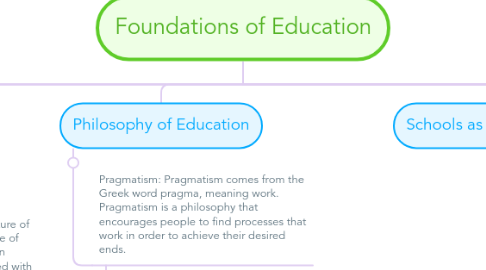
1. Politics of Education
1.1. The Four Specific Purposes of Education
1.1.1. Political: The political purposes of schooling are to inculcate allegiance to the existing political order (patriotism); to prepare citizens who will participate in this political order (e.g., in political democracies); to help assimilate diverse cultural groups into a common political order; and to teach children the basic laws of society.
1.1.2. Social: The social purposes of schooling are to help solve social problems; to work as one of many institutions, such as the family and the church (or synagogue) to ensure social cohesion; and to socialize children into the various roles, behaviors, and values of the society. This process, referred to by sociologists as socialization, is the key ingredient to the stability of any society.
1.1.3. Economic: The economic purposes of schooling are to prepare students for their later occupational roles and to select, train, and allocate individuals into the division of labor. The degree to which schools directly prepare students for work varies from society to society, but most schools have at least an indirect role in this process.
1.1.4. Intellectual: The intellectual purposes of schooling are to teach basic cognitive skills such as reading, writing, and mathematics; to transmit specific knowledge (e.g., in literature, history, the sciences,etc.);and to help students acquire higher-order thinking skills such as analysis, evaluation, and synthesis.
1.2. Perspectives:
1.2.1. Conservative: The conservative viewpoint has its origins in the 1800's and is based on the ideas of social Darwinism. This perspective asserts that individuals must complete in the social environment to survive; human progress is dependent on individual initiative and hard work.
1.2.2. Liberal: The liberal viewpoint has its origins in the 1900's and is based on the works of John Dewey and progressivism. This perspective is concerned with equality and balancing the economic productivity of capitalism with the social and economic needs of the people.
1.2.3. Radical: The radical viewpoint is based on the writings of German economist and philosopher Karl Marx (1818-1883). The radical viewpoint suggests that the capitalist system produces fundamental contradictions that will lead to a transformation into socialism.
2. History of U.S. Education
2.1. Reform movement:
2.1.1. The twentieth/ twenty first century reform movement had the most influence on education because this was the time when their stopped being such a big gap in good quality schools. It was during the time when Head Start was started. The no child left behind act was established, and segregation was ended.
2.2. Historical interpretations of U.S. Education:
2.2.1. Conservative: Conservatives assert that due to progressive/liberal movements in education, academic quality and traditional goals of education have suffered.
3. Sociology of Education
3.1. Relationship between School and Society
3.1.1. Functional Theories: It begins with a picture of society that stresses the interdependence of the social system; these researchers often examine how well the parts are integrated with each other. Functionalist view society as a machine. Emile Durkheim was the first to embrace this view.
3.1.2. Conflict Theories: In this view the glue of society is economic, political, cultural, and military power. Conflict sociologists do not see the relation between school and society as unproblematic or straightforward. From a conflict point of view schools are like battlefields where everyone struggles.
3.1.3. Interactional Theories: Interactional theories about the relation of school and society are primarily critiques and extensions of the functional and conflict perspectives. Interactional theories attempt to make the commonplace strange by turning on their heads everyday taken for granted behaviors and interactions between students and students, and between students and teachers.
3.2. Three Effects of Schooling on Individuals
3.2.1. Employment: Most students believe that graduating from college with lead to greater employment opportunities, and they are right. It appears that job performance is not related to education. It is merely a gateway to get the higher paying jobs. Most schools do not provide significant job skills to their students.
3.2.2. Teacher Behavior: Teachers have a huge impact on student learning and behavior. Teachers are models for students. They set standards for students and influence student self-esteem and sense of efficacy.
3.2.3. Tracking: Tracking has a critical impact on student mobility. Tracking refers to the placement of students in curricular programs based on students' abilities and inclinations. Track placement directly affects cognitive development.
4. Philosophy of Education
4.1. Pragmatism: Pragmatism comes from the Greek word pragma, meaning work. Pragmatism is a philosophy that encourages people to find processes that work in order to achieve their desired ends.
4.1.1. Generic Notions: Dewey's progressive methodology rested on the notion that children were active, organic beings, growing and changing, and thus required a course of study that would reflect their particular stages of development.
4.1.2. Key Researchers: George Sanders Peirce, William James, and John Dewey
4.1.3. Goal of Education: The importance of school as a place where ideas can be implemented, challenged, and restructured , with the goal of providing students with the knowledge of how to improve social order.
4.1.4. Role of Teacher: In a progressive setting, the teacher is no longer the authoritarian figure from which all knowledge flows; rather, the teacher assumes the peripheral position of facilitator.
4.1.5. Methods of Instruction: Dewey believed that children should start their mode of inquiry by posing questions. This method of instruction is referred to as the problem-solving or inquiry method.
4.1.6. Curriculum: Progressive educators are not wedded to a fixed curriculum either; rather, curriculum changes as the social order changes and children's interests and needs change.
